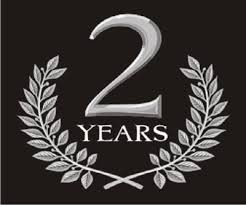
Anniversary and Celebration
By Anthony Casperson
5-19-18
Here we are. It’s the second anniversary of Brushstrokes of a Theonerd. For two years I’ve been writing blogs and preaching sermons. I’ve been thinking for quite some time about what to write for today.
The thought of celebration floated around my head. But, I started thinking about the idea of celebration and its relation to happiness. Does celebration require happiness? Or is it like joy, where happiness can be a part of it, but isn’t a necessary part? If joy is finding God’s purpose in our present circumstances, can celebration be a part of that?
So, I began by looking at what the word “celebrate” means. Not our current definition, that which has been interpreted through generations of people who’ve equated joy with happiness. Rather, what was the range of meaning from its origin?
The word comes from Latin. It has a range of “oft-repeating” something, of “frequenting” something, and even something that’s “well-attended.” But what seems to be its original intent is “performing publicly with appropriate ceremony.” Often the word was used in reference to the gathered worship of God: singing his praises.
And while the idea of celebration being “a commemoration with a demonstration of joy” has been with us since the mid-1500’s, there are older understandings of celebration including demonstrations of sorrow and regret. One could celebrate while being sorrowful. The position of sorrow doesn’t restrain us from honoring God with the praises that he’s due.
A celebration is a repetitious, public, commemoration of God’s work in the lives of his people. It’s a reminder of the joy a particular event brought to our lives, regardless the circumstances that led us to see God’s work.
This made me think about the Passover meal (Seder). The event commemorated is the freeing of Israel’s people from slavery in Egypt. And while it might be tempting to point out that this is a happy moment in the lives of the Israelites (freedom seen as wondrously good), it needs to be said that the original Passover meal was prepared and eaten while they were still in slavery. The sorrowful aspect of the celebration is not forgotten.
As a matter of fact, if you look at the traditional commemoration of this meal, you’ll see that a scripted question-answer between the youngest and eldest members of the family occurs as a reminder/teaching moment for all present. One of the five questions, which the junior member of this duo is supposed to ask, inquires why on this night are bitter herbs the only vegetables eaten. And the answer, given by the elder, is to remind us of the bitterness of slavery endured in Egypt.
The bitterness, the sorrow, is emphasized. It’s not forgotten or swept away. Even more so, when you realize that the herbs are dipped in salt water to represent the tears shed by those enslaved for hundreds of years.
And in this state, God moved. He arose to aid his people. God is glorified even the midst of remembering the sorrow of his people.
So, whether in the heights of happiness or the depths of sorrow, join me as I celebrate the movement of God in my life to give voice to those who struggle in the depths. It all started because of anxiety and panic attacks, but I hope it finds its fullness in the glory of God from all of us joined together.




